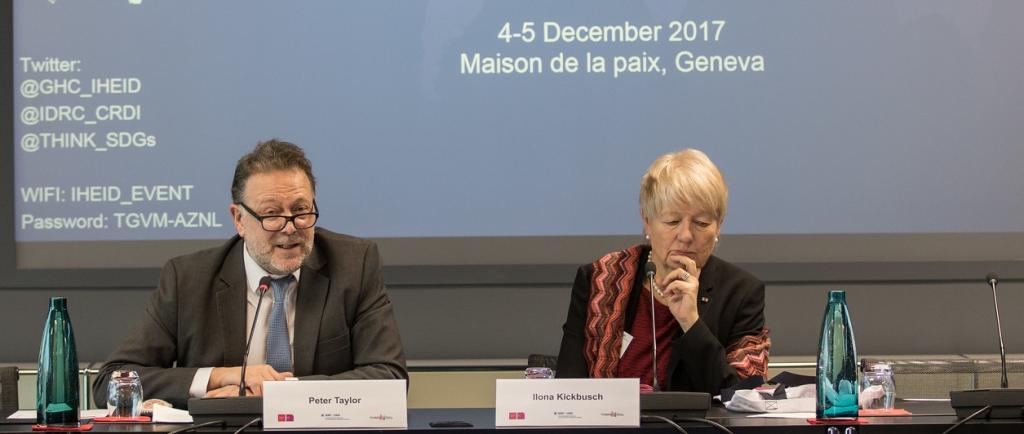“Today, there is not a single action we take that is not connected to one of the 17 [Sustainable Development] Goals”. With these words, UNOG Director-General Michael Møller illustrated the far-reaching impact of the 2030 Agenda at the public event “1000 Days of SDGs – Is International Geneva walking the talk?” on 4 December 2017. The event marked the beginning of a two-day meeting of global health policy think tanks and academic institutions, who came together in Geneva from more than 35 countries to analyse the political determinants of SDG implementation and discuss how to accelerate the implementation of the health-related SDGs.
If the 17 Goals permeate the actions of actors in Geneva and beyond, David Nabarro reminded participants of the equal importance of the principles underpinning them: universality, interconnectivity, inclusive implementation, integrated action, and partnership. The meeting provided an opportunity to bring a breath of fresh air to these principles through the collective engagement of policy research institutions in all regions of the world.
Universality, calling for achieving the SDGs in all countries without leaving anybody behind, will only be possible with a shift of focus from the global to the local. Mutual learning between countries and organisations can help identify best practices, gaps, and innovative solutions. The United Nations and other global institutions also need to learn from local realities and context-specific implementation efforts. At the same time, local processes must remain embedded in a global – universal – vision and follow global norms and standards. In this regard, the network THINK_SDGs, bringing together think tanks from around the world to work on the health-related SDGs, provides a platform for the sharing of knowledge as a global public good, nourishing a dynamic global-to-local and local-to-global relationship.
Interconnectivity of all the goals not only implies a new way of working, but also new ways of thinking, communicating, financing, and reporting. Priority-setting at the country level should, therefore, take into account what enabling environment is needed to shape policies for better health outcomes in the SDG era. Greater attention should in particular be paid to the level of knowledge on the SDGs by parliamentarians, as they are responsible for adopting policies and allocating budgets. Think tanks and academic institutions have a role to play in reinforcing the interconnectivity principle by performing policy-relevant, trans-disciplinary research and by emphasising co-construction and sharing of knowledge for monitoring and reporting.
Inclusive implementation highlights the importance of engaging all stakeholders. Limited community and citizen engagement raises questions on the dissemination of the SDGs and on the extent to which participatory mechanisms are being developed. The private sector also needs to be part of SDG efforts, in terms of investments and financing and by integrating sustainability principles into their business practices. With regard to think tanks and academic institutions, there is a need to go beyond a technical approach and recognise that political factors are inherent and necessary to their work if they want to make a difference at the political level.
Integrated action applies not only to the goals, but also to the actors. There is an imperative of integration for governments, horizontally across sectors, and vertically at different levels of governance – and accountability mechanisms need to reflect this complexity. Integration also applies to the United Nations, where cross-agency mobility still remains limited. At the same time, a whole-of-society approach is linked to the inclusiveness principle and highlights that all actors in society have a role to play. The THINK_SDGs network is contributing to the integration effort by analysing governance mechanisms for the implementation of the health-related SDGs to identify gaps and lessons learnt on what has been – or has not been – effective. Country case studies in different regions have highlighted the difficulties of adopting multisectoral approaches and the limited attention paid to health within the SDGs. The structure of government and the relative pre-eminence of sectors – including in terms of budgetary allocation – are two of the factors to take into account in this analysis.
Finally, partnering does not only require working with institutions with a shared purpose, but also for actors to work outside of their comfort zone. David Nabarro shared a vision for a “transformative community” of actors able to go beyond their institutional boundaries to collectively develop new ways of tackling complex challenges. Think tanks and academic institutions need, therefore, to shift from perceiving themselves as simple generators of knowledge to becoming actors of change. As challenges are common across countries, an important element in building a “transformative community” is the need to go beyond the North/South divide to have shared solutions.
If after two years of SDG discussions and activities some already start feeling a certain SDG fatigue – with the risk of perpetuating a business-as-usual approach to development – the 4-5 December meeting of global health policy think tanks and academic institutions gave new inspiration and force to the SDG vision. The network THINK_SDGs will continue working at the global, regional and national levels to provide opportunities for mutual learning, create greater solidarity, and build commitment of, and legitimacy for, think tank engagement on the implementation of the health-related SDGs.


